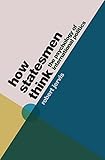How statesmen think the psychology of international politics /Robert Jervis
Material type: TextPublisher number: International Book Distributors | ;Flat No.17,Prakash Apartments ,5 Ansari Road,DaryaGanj,New Delhi-110002Publication details: Princeton : Princeton University Press , 2017Description: x, 283 páges ;24 cmISBN:
TextPublisher number: International Book Distributors | ;Flat No.17,Prakash Apartments ,5 Ansari Road,DaryaGanj,New Delhi-110002Publication details: Princeton : Princeton University Press , 2017Description: x, 283 páges ;24 cmISBN: - 9780691176444
- 327.1019 J55H
| Item type | Current library | Call number | Status | Barcode | |
|---|---|---|---|---|---|
 Book
Book
|
Air University Central Library Islamabad | 327.1019 J55H (Browse shelf(Opens below)) | Available | P13142 |
Acknowledgments Introduction Political Psychology Understanding Beliefs The Drunkard's Search Heuristics and Biases Representativeness, Foreign Policy Judgments, and Theory-Driven Perceptions Prospect Theory: The Political Implications of Loss Aversion Political Psychology And International Relations Theory Signaling and Perception: Projecting Images and Drawing Inferences Political Psychology Research and Theory: Bridges and Barriers Why Intelligence and Policymakers Clash Identity and the Cold War Psychology And National Security Deterrence and Perception Psychology and Crisis Stability Domino Beliefs Perception, Misperception, and the End of the Cold War
Robert Jervis has been a pioneering leader in the study of the psychology of international politics for more than four decades. How Statesmen Think presents his most important ideas on the subject from across his career. This collection of revised and updated essays applies, elaborates, and modifies his pathbreaking work. The result is an indispensable book for students and scholars of international relations.
How Statesmen Think demonstrates that expectations and political and psychological needs are the major drivers of perceptions in international politics, as well as in other arenas. Drawing on the increasing attention psychology is paying to emotions, the book discusses how emotional needs help structure beliefs. It also shows how decision-makers use multiple shortcuts to seek and process information when making foreign policy and national security judgments. For example, the desire to conserve cognitive resources can cause decision-makers to look at misleading indicators of military strength, and psychological pressures can lead them to run particularly high risks. The book also looks at how deterrent threats and counterpart promises often fail because they are misperceived.
How Statesmen Think examines how these processes play out in many situations that arise in foreign and security policy, including the threat of inadvertent war, the development of domino beliefs, the formation and role of national identities, and conflicts between intelligence organizations and policymakers.
There are no comments on this title.

